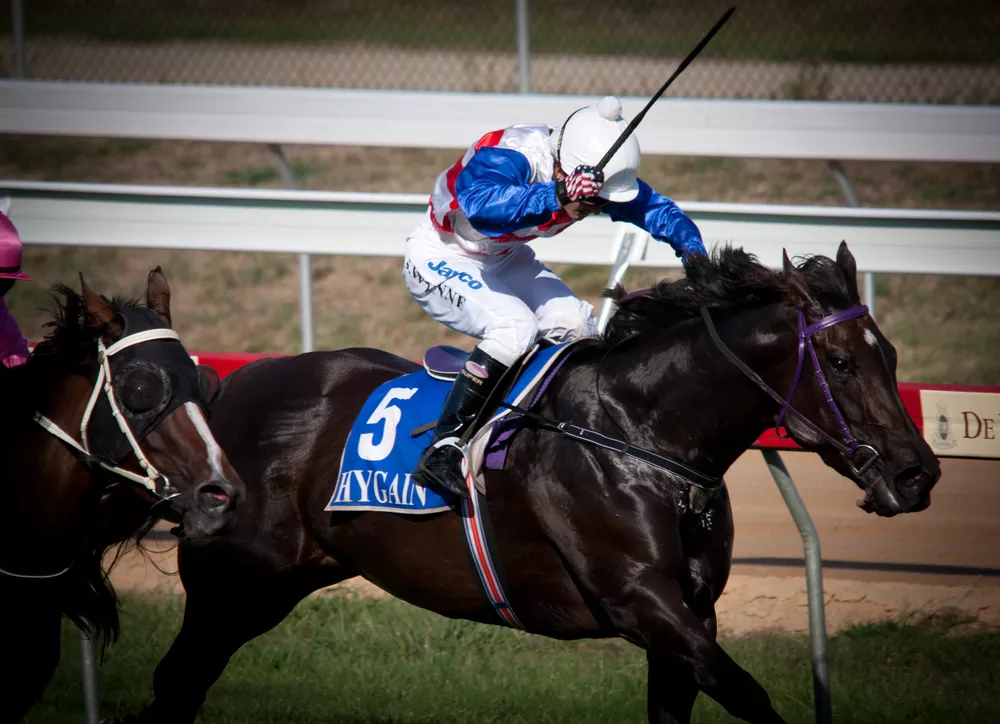Working with the Jockey Club, Animal Wellness Action helped secure statutory repair to the 2020 Horseracing Integrity and Safety Act, after a federal appellate court questioned one key provision
WASHINGTON, D.C. – Today, Animal Wellness Action applauded lawmakers in Congress for approving provisions in the year-end federal spending bill to benefit horses in Thoroughbred racing, in Tennessee Walking Horse shows, and in other sectors of the equine world. The bill repairs a provision of the Horseracing Integrity and Safety Act (HISA) that a federal appellate court deemed unconstitutional in November, keeping a national law in place designed to end the scourge of race-day doping in the Thoroughbred industry. The Jockey Club was also instrumental in urging passage of the amendment to HISA.

The spending bill also provides a record level of $4.1 million to enforce the Horse Protection Act (HPA) of 1970 for FY2023, continues the de facto ban on horse slaughter on U.S. soil, and includes funding and directives for the Bureau of Land Management to pursue more forward-facing, more humane on the range management of wild horses and burros.
“We applaud the Congress for making the statutory fix to remedy a legal concern that came from a federal appellate court,” said Marty Irby, executive director at Animal Wellness Action and an eight-time world champion equestrian. “But it wasn’t without a fight, and it’s hard to believe that horsemen and even some politicians are fighting to preserve race-day doping in Thoroughbred racing in America. Their work puts horses and jockeys at risk and scrambles the results for gamblers and other fans of the sport.”
“The omnibus spending bill amounts to an important victory for horses, as Congress continues to defund horse-slaughter inspections as part of the year-end spending bill, as this ensures the cruel and predatory horse-slaughter industry will not regain a foothold in the U.S.,” said Scott Beckstead, equine welfare specialist and director of campaigns for Animal Wellness Action and Center for a Humane Economy. “And with the Bureau of Land Management’s unprecedented, shameful assault on our nation’s iconic wild horses and burros continuing unchecked to benefit commercial livestock, it’s critical that Congress has again appropriated millions for humane fertility control so more of these living icons can thrive wild and free on our public lands.”
Background
HISA was signed into law two years ago this week by President Donald J. Trump, the first federal horse protection law enacted in half-a-century. The measure banned race day doping in Thoroughbred horse racing in the United States and created a uniform national standard for regulation, enforcement, and drug testing in the sport. While the measure was signed into law in 2020, it didn’t take effect until July of this year when implementation began. Subsequently the attorneys general from Louisiana and West Virginia joined lockstep with the Horsemen’s Benevolent Protective Association (HBPA) in a legal battle that seeks to maintain the status quo and allow the rampant doping and abuse in the sport to continue. The new language will ensure proper federal oversight by the FTC of the non-profit Horseracing Integrity and Safety Authority the new law created.
The record breaking HPA enforcement funding represents six times the amount seen just four years ago. While $4.1 million in the USDA enforcement budget is no substitute for a stronger legislative ban on soring, this money will allow more robust enforcement of the existing law that does have important strictures on the barbaric practice of “horse soring.” The House passed the Prevent All Soring Tactics Act in September, which would have helped end soring, but as expected, the Senate failed to act on the measure.
Animal Wellness Action has made increasing funding for enforcement of the HPA a top priority. The FY2023 HPA funding is nearly six times the amount appropriated in 2018. Until 2019, federal funding for HPA enforcement had never exceeded $705,000 for a single fiscal year. Animal Wellness Action, which was formed in 2018, has made HPA funding a top priority in the war to end “soring” – the intentional infliction of pain to horses’ front limbs to induce an artificial high-step gait known as the “big lick” that’s prized at Tennessee Walking Horse shows in the Southeastern U.S.
The larger equine community and animal protection world have long recognized that a lack of HPA funding for enforcement has contributed to rampant soring at show events, especially in Tennessee and Kentucky. Animal Wellness Action also helped secure HPA funding in the amount of $1 million for FY2020, just over $2 million for FY2021, and $3.04 million for FY2022 in collaboration with stakeholders in the Tennessee Walking Horse industry.


